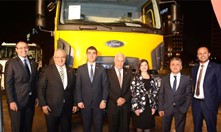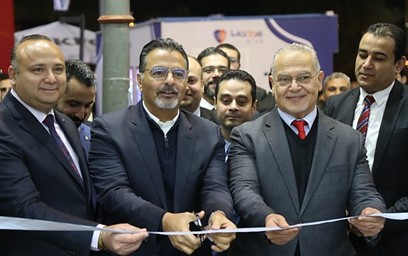Eyes on Egypt
Egypt – once the cradle of one of the world’s most advanced and powerful ancient civilizations – has the latent potential to be one of the largest automotive markets in the Middle East and North Africa region, but its potential has so far been unfulfilled. Is this beginning to change? We spoke to Tarek Abdullatif, Country Director Egypt, about the evolving Egyptian automotive market, his 30+ years with Abdul Latif Jameel Motors, and his plans to lead the business through its next phase of growth.
It’s over three decades since Tarek Abdullatif joined Abdul Latif Jameel, but his passion for the business and his vision for the future is as strong now as when he first joined in 1991.

Regional Director, Egypt
Abdul Latif Jameel Motors International
He was straight out of Cairo University, Egypt, where he studied business management, when he saw a recruitment advertisment for Abdul Latif Jameel. He’d heard of the brand and knew it was a big company, so he applied and got the job, working as a Lexus salesman for Abdul Latif Jameel Motors in Saudi Arabia. At that time, the company was already a well-known name in its home market, but its global footprint was still developing.
By 1995, Tarek’s interest and expertise in product and technical knowledge saw him move from sales to marketing as a product planning specialist. His potential was nurtured by the business, and he was drafted into its ‘high performing individuals’ program (today the Abdul Latif Jameel Management Trainee Program), receiving tailored training and coaching to enable him to achieve his career potential with the company. Several promotions later, and by 2005 he was general manager of the planning group under Marketing Division at that time.
He was still based in Saudi Arabia, but when Abdul Latif Jameel was looking to launch the Daihatsu brand in Egypt, Tarek was picked he moved back to Cairo as country manager for Egypt.
“I came to Cairo and helped to build the team. We managed all the preparations for the launch, set up the sales network, aftersales, everything. We launched in June 2006, and it was a great success,” recalls Tarek.

The next 10 years saw the company significantly expand its operations in Egypt and North Africa, with a number of successful launches, including Ford, Hino Trucks and Ford Trucks. In 2020, he led the launch of Auto Store, a multi-brand automotive retail network.
As Country Director Egypt, his responsibilities cover three main automotive business units: Auto Jameel; the official distributorship for Ford in Egypt which includes distribution, network development, retailing, aftersales, etc; ALJICO Misr, the Distributor of heavy trucks, which includes Hino heavy trucks and Ford heavy trucks.
Abdul Latif Jameel are also official dealers for MG, Peugeot, Renault and Mitsubishi in Egypt, and have a fast-growing presence in the previously-owned-vehicle (POV) market under the brand “Auto Store”.
Untapped potential
The Egyptian automotive market is often cited as one of enormous, yet untapped, potential. For a country of its size, comparable in population terms to Turkey or Iran pushing 108 million people in 2022, sales should be around 600,000 to 800,000 units per year, maybe up to one million during good years. In reality, Egyptian automotive sales never reach 300,000. The reason? Regular cycles of economic (and political) instability and the relatively high price of vehicles vs. household disposable income.

Out of a population of over 107 million, only around 5% are able to afford a car, says Tarek. It is analogous to the situation 15 or 20 years ago in China. But whereas a decade and more of steady growth has propelled the Chinese automotive market to become the biggest in the world, Egypt remains stuck in a cycle of instability and low wages. Nevertheless, Tarek remains optimistic that eventually, the potential of the country’s automotive market will be realized.
“Demand doesn’t disappear. The real demand growth is always there, because we have a large population that is growing 2.5% a year. But meeting this demand depends on the economic situation and the ups and downs of the market. If we can resolve that, I believe demand will explode and opportunities will come,” says Tarek.
Government strategy, of course, is essential not only to resolving Egypt’s socio-economic volatility, but also to shaping the development of the country’s automotive market.
Two of the biggest policy focuses are on local assembly (so called semi- or completely- ‘knocked-down (SKD and CKD)) and electric vehicles (EVs). In early 2022, the government unveiled the latest version of its new automotive strategy. The strategy aims to increase local vehicle manufacturing and assembly and increase the sector’s competitiveness to become a regional manufacturing hub and boost exports[1].
It also outlined proposals to introduce incentives for locally assembled EVs, and to oblige real estate developers to install charging points in new residential and commercial projects.
Going electric
Over the last five years, EVs have reshaped automotive markets across the globe. Egypt is keen to embrace the EV revolution, but the country’s EV market is still at a very nascent stage.
 No EV distributors currently have an official presence in Egypt and the few EVs on the roads tend to be second-hand parallel imports from China or Europe. The government is keen to change this, particularly given the country’s hosting of the UN’s climate change conference COP 27 in Sharm El Sheikh in November 2022.
No EV distributors currently have an official presence in Egypt and the few EVs on the roads tend to be second-hand parallel imports from China or Europe. The government is keen to change this, particularly given the country’s hosting of the UN’s climate change conference COP 27 in Sharm El Sheikh in November 2022.
It has launched a tender for the management and operation of 3,000 electric car charging stations within 18 months, starting with the governorates of Cairo, Giza, Alexandria, and Sharm El-Sheikh, at an estimated cost of EGP 450 million[2]. It has also announced plans to produce the first Egyptian electric car in 2023, and is busy updating existing automotive regulations, which were often based on engine capacity, to accommodate electric vehicles.
“The government is very public in its support for electric vehicles. People know this is the future and that they are coming to Egypt soon, but it will take time. Not only to build the infrastructure and increase supply, but also to generate demand. At the moment, buying an EV in Egypt is a high-risk proposition. People need to be confident that will no longer be the case and be incentivized to choose electric. Once that happens, I think take-off will be quick, like we saw in China,” believes Tarek.
China is one of the most exciting global automotive markets, he believes. The technology, the quality, the marketing has rapidly caught up with the standards and expectations of the West. Where Chinese brands are still weaker, however, is their exporting experience. Until recently, Chinese brands were largely focused on the domestic market. As their focus becomes more global, there are opportunities to support them in terms of supply chain, logistics, aftersales, customer preferences.
“Abdul Latif Jameel can be a great bridge to the Middle East and North Africa. We know the region very well. We have the systems and infrastructure in place. Brands don’t have to build it themselves from scratch, we can partner with them to make it as straightforward and smooth as possible,” says Tarek.
Digital future
As for Abdul Latif Jameel Motors’ own growth plans for Egypt, there are two strategies Tarek believes have the potential to drive the business’s development over the next few years. One is investing in digital; the other is building new partnerships.

Multi-brand showrooms are very popular in Egypt. But building, developing and marketing these showrooms is complex, expensive, and time consuming. Research shows that most people looking to buy a new car start their journey online, looking what models are available, comparing specifications and reviewing prices, for example. Tarek says Abdul Latif Jameel’s strategy is to invest in its digital presence so it can grab customers at this digital stage of their journey, and then at the appropriate point, direct them to its offline showrooms.
“Our aim is to develop our digital platform, with a strong emphasis on customer convenience. We are automotive people. We know our customers; we understand the details and key milestones of the customer journey. We have used this insight to develop our online proposition,” he explains.
“Customers have options at every stage – the brand, the model, the loan, the insurance, the accessories, the warranty. This is all done online, and then we bring them into the showroom to complete the final few stages of the purchase process.”
Version one of the digital platform, is due to be launched in January 2023, with more functionality phased in during the year.

Partners in growth
In terms of new partnerships, most, if not all, of the biggest automotive brands already have well established distribution networks in Egypt. This leaves little room for inorganic growth, explains Tarek, so instead, the Abdul Latif Jameel Motors strategy is to take a new brand that is aligned with the business’s values, objectives and approach, and introduce the brand into the Egyptian market.
“We will start with a clean sheet of paper and put all our experience behind it, our industry expertise, our resources and build it into a successful brand in Egypt. Our plans were interrupted because of the market situation, but we hope to be able to put this strategy into action very soon,” says Tarek.
Exactly how soon depends on the evolving regulatory and policy context of the Egyptian market, but despite the hold-ups, Tarek is confident in the market’s long-term potential – and of Abdul Latif Jameel Motors’ place within it.
“As Abraham Lincoln famously said, ‘this too shall pass’. And when it does, and the market settles down, we are ready. We have a resilient team. We have a clear growth strategy. We are here for the long term. We will implement a successful launch of the new brand and we will show what Abdul Latif Jameel Motors is all about,” says Tarek.
[1] https://enterprise.press/stories/2022/03/13/a-first-look-at-the-long-awaited-automotive-strategy-bidding-for-new-ev-charging-company-management-this-week-66761/
[2] https://english.ahram.org.eg/News/464553.aspx





 1x
1x

 Added to press kit
Added to press kit


